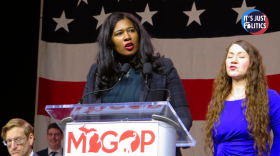Michigan Republicans awarded all 39 of the state’s remaining presidential delegates to Donald Trump during a convention Saturday, a clear sign of his firm grasp on the party’s base ahead of a November election in the critical swing state.
While the Michigan GOP has remained entrenched in division, chaos and legal disputes, Saturday’s convention showed that Trump remains the unifying force between the party’s warring factions. Trump received 1,575 votes from precinct delegates, compared to 36 for Nikki Haley.
“Clearly, Michigan is Trump country,” said Michigan GOP Chair Pete Hoekstra, who recently took over the party after former Chair Kristina Karamo was ousted.
Trump won Michigan’s Feb. 27 Republican primary handily, receiving 68% of the vote compared to rival Nikki Haley’s 27%.
The win gave a clear indication of Trump’s standing in Michigan ahead of November, but a majority of Michigan’s GOP delegates were awarded Saturday. Trump easily won all 39 of the presidential delegates at play, receiving close to 90% of the vote in all 13 congressional districts.
Michigan Republicans were forced to split their primary into two parts after Democrats who control the state government moved Michigan into the early primary states, violating the national Republican party's rules.
Trump, who has won every presidential contest in which he’s appeared on the ballot and earned 122 delegates, is expected to lock up the party’s nomination soon after Super Tuesday.
Saturday's convention comes just days after a Kent County judge affirmed that Karamo was removed properly by party members in January. The decision officially hands the state party over to Hoekstra, a former congressman recognized last month as state chair by the Republican National Committee.
Hoekstra called Saturday a “launching” for the new version of the party. State lawmakers and congressional candidates flooded the convention, a welcome sign for a party that most established Republicans have avoided since Karamo became chair.
“It’s an enthusiastic crowd. Recognizing that the job of the party is to win in November and that’s what they’re excited about,” Hoekstra told reporters Saturday.
At least 24 county GOP parties did not send precinct delegates — who are tasked with allocating the presidential delegates — due to not registering for the convention in time. Many of the county GOP parties denied access were loyal to Karamo and had waited to see what the court's final ruling would be.
Before being ousted and eventually barred from the chair position by a judge, Karamo had planned for the convention to take place at the Huntington Place in Detroit.
In a statement, Daire Rendon, chairwoman for the 1st Congressional District Republican committee, called Hoekstra's decision not to let some counties attend “not acceptable” and said that the group denied access would be holding their own convention in northern Michigan.
"The grassroots are watching their party being stolen from them,” said Rendon, a former GOP state representative who is on trial for tampering with election machines following the 2020 election.
Counties had been given multiple warnings to register for the Grand Rapids convention before the deadline, according to Oakland County GOP chair Vance Patrick. He added that alternate delegates would fill slots vacated by the absent county parties.
Cindy Banner, a precinct delegate from Charlevoix County, drove nearly 200 miles to attend Saturday's convention. She was turned away at the door and told she wouldn't be able to vote because her county hadn't been credentialed.
“I was voted in by my constituents. Are those not enough credentials?” said Banner.
While the intraparty disputes continued Saturday, they had little impact on the allocation of presidential delegates. Trump has a firm grasp on nearly all aspects of Michigan's Republican Party and endorsed Hoekstra amid the intra-party squabble this winter.
Appealing to voters outside of Trump's base will likely be a deciding factor in whether he can win the critical swing state in November. In Tuesday's primary, Trump did worse in suburban counties such as Oakland and Kent, which were key in his loss of Michigan four years ago.
Robert Zelle, a precinct delegate from Saginaw, had initially supported Ben Carson for president in 2016 but said he eventually voted for Trump because he's a “businessman" who "can't be bought.” To win Michigan this year, Zelle said that Trump needs to display more “demonstrate compassion” for communities such as his “that are struggling.”
“You’ve got to demonstrate to the people that you care about them,” said Zelle. “You can’t care about somebody but you won't to go to the inner city.”









